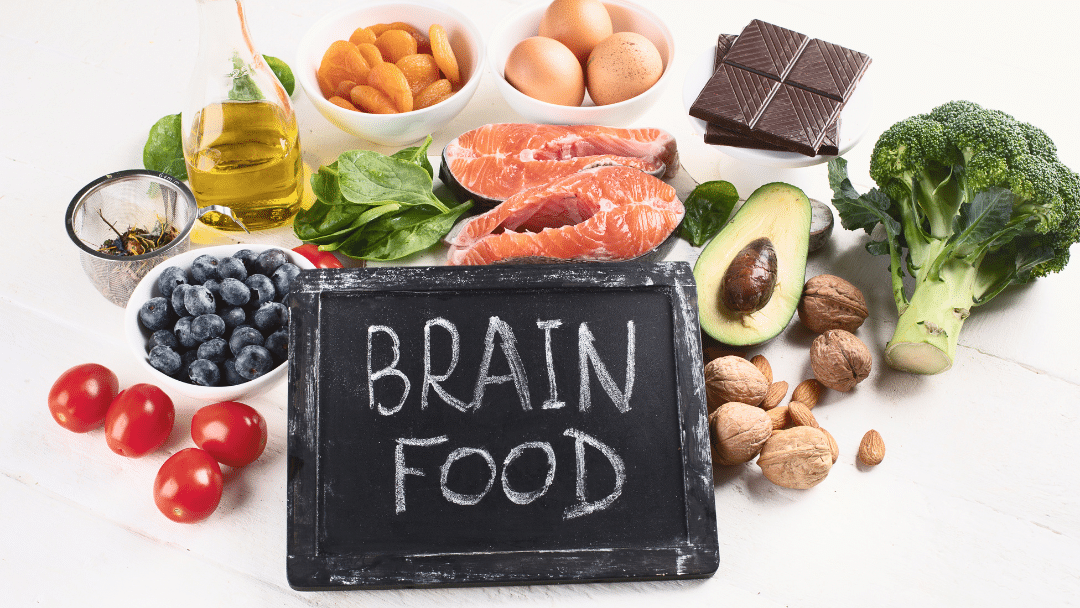Brain Health
Last month we took a look at Gut Health and felt that for August a natural follow up would be to see how we can support and promote our Brain health through easy nutritional additions on a daily or weekly basis.
The brain and gut are closely linked through a complex communication system known as the gut-brain axis. This bidirectional relationship involves several mechanisms and pathways, including the nervous system, the endocrine system, the immune system, and the gut microbiota.
Maintaining optimal brain health is crucial for overall well-being and cognitive function. Nutrition plays a significant role in supporting brain health.
Certain foods and nutrients are known to promote cognitive function, protect against neurodegenerative diseases, and enhance memory and mood.
Here are some key dietary components and foods that are beneficial for brain health:
Brain Health Nutrition
Omega 3 Fatty Acids
Sources: Fatty fish (salmon, mackerel, sardines), flaxseeds, chia seeds, walnuts.
Benefits: Essential for brain function and development. They help build cell membranes in the brain and have anti-inflammatory effects that may protect against brain aging and cognitive decline.
Antioxidants
Sources: Berries (blueberries, strawberries, blackberries), dark chocolate, nuts, seeds, and colourful vegetables (spinach, kale, bell peppers).
Benefits: Protect the brain from oxidative stress, which can damage brain cells and contribute to aging and neurodegenerative diseases.
Vitamins and Minerals
1. Vitamin E
Sources: Nuts (almonds, hazelnuts), seeds, spinach, broccoli.
Benefits: Acts as an antioxidant, protecting cells from damage.
2. B Vitamins (B6, B12, Folate)
Sources: Whole grains, eggs, legumes, leafy greens, fish.
Benefits: Play a role in producing energy for brain cells and forming neurotransmitters.
3. Vitamin D
Sources: Fatty fish, fortified foods, and sunlight exposure.
Benefits: Supports brain function and a deficiency is linked to cognitive decline and mood disorders.
4. Magnesium
Sources: Leafy greens, nuts, seeds, whole grains, dark chocolate.
Benefits: Supports brain plasticity, which is crucial for learning and memory.
Healthy Fats
Sources: Avocados, olive oil, nuts, seeds, fatty fish.
Benefits: Essential for brain function, healthy fats help build and repair brain cells, and also improve brain function and memory.
Polyphenols
Sources: Tea (green tea, black tea), coffee, red wine, fruits (especially berries), and vegetables.
Benefits: Improve cognitive function and memory by reducing inflammation and promoting blood flow to the brain.
Dietary Fibre
Sources: Whole grains, fruits, vegetables, legumes.
Benefits: Promotes gut health, which is linked to brain health through the gut-brain axis.
Hydration
Importance: Proper hydration is vital for maintaining concentration and cognitive function. Even mild dehydration can impair brain function.
Specific Foods for Brain Health
1. Blueberries: High in antioxidants, especially flavonoids, which improve memory.
2. Turmeric: Contains curcumin, which has strong anti-inflammatory and antioxidant benefits, and may help with memory and stimulate the growth of new brain cells.
3. Broccoli: High in antioxidants and vitamin K, which is essential for forming sphingolipids, a type of fat that’s densely packed into brain cells.
4. Pumpkin Seeds: Rich in antioxidants, magnesium, iron, zinc, and copper, which are all important for brain health.
5. Oranges: High in vitamin C, which is key for preventing mental decline.
Lifestyle Tips
Balanced Diet: Incorporate a variety of nutrient-rich foods to ensure you get a wide range of vitamins and minerals.
Regular Exercise: Physical activity promotes blood flow to the brain and stimulates the growth of new brain cells.
Mental Exercise: Engage in activities that challenge your brain, such as puzzles, reading, and learning new skills.
Adequate Sleep: Ensure you get enough sleep, as it is essential for memory consolidation and overall brain health.
Adopting a balanced diet rich in these nutrients, along with healthy lifestyle practices, can significantly contribute to maintaining and enhancing brain health throughout life.
Are you In Pain? – We can help!
Are you experiencing issues with your mobility, performing day to day activities or stamina? Consult a registered chiropractor for personalized advice and treatment options.
Taking proactive steps to care for your spinal health can prevent future issues and promote overall mobility, endurance and well-being.
If you’re struggling with pain or discomfort get in touch today to book a consultation at either our Bridgend or Porthcawl practice – click here to book online or simply get in touch here to see how we can help.
Always be sure that your spinal health is taken care of by a registered chiropractor.
**Always be sure to carry out your own due diligence and research on information on our blog.
**If you are on medication, always consult with your health practitioner before making changes to your diet, exercise or lifestyle.

